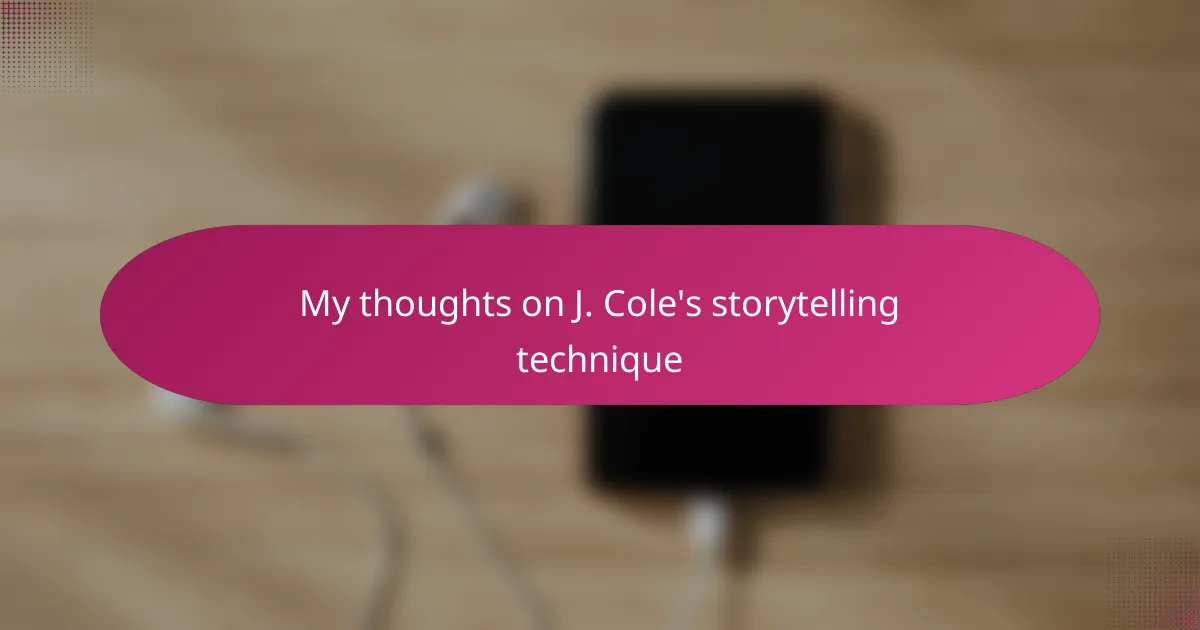Key takeaways
- Storytelling in rap, particularly by J. Cole, offers a powerful connection through personal experiences and emotional honesty.
- J. Cole combines vivid imagery and relatable themes, making his lyrics feel like intimate conversations and inviting deep reflection.
- His storytelling addresses societal issues while remaining authentic, encouraging listeners to confront their own truths and struggles.
- Key techniques for effective storytelling include focusing on small, meaningful moments and blending personal narratives with broader social themes.
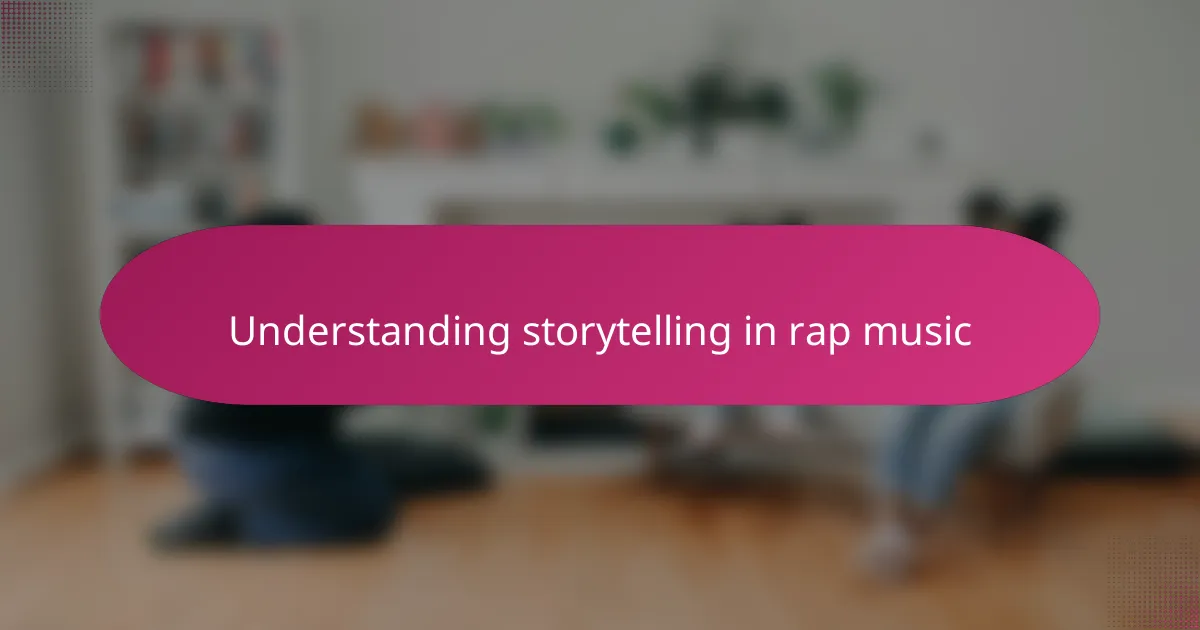
Understanding storytelling in rap music
Storytelling in rap isn’t just about rhyming words; it’s about painting vivid pictures with language. I remember the first time a rap song made me feel like I was living the story myself—it was like stepping into someone else’s world through their words. Have you ever been so absorbed in a song that you forgot you were just listening? That’s the power of storytelling in rap.
What I find fascinating is how rappers use personal experiences to connect with listeners. It’s more than entertainment; it’s a shared journey. When you hear a rapper narrate struggles, hopes, or triumphs, it bridges gaps you might not expect, making you reflect on your own life.
Sometimes, I ask myself why certain songs stick with me longer than others. Could it be the emotional honesty packed into each verse? In storytelling, every detail matters—it’s the little things that make a narrative authentic and relatable, and that’s what makes rap so compelling as a storytelling medium.
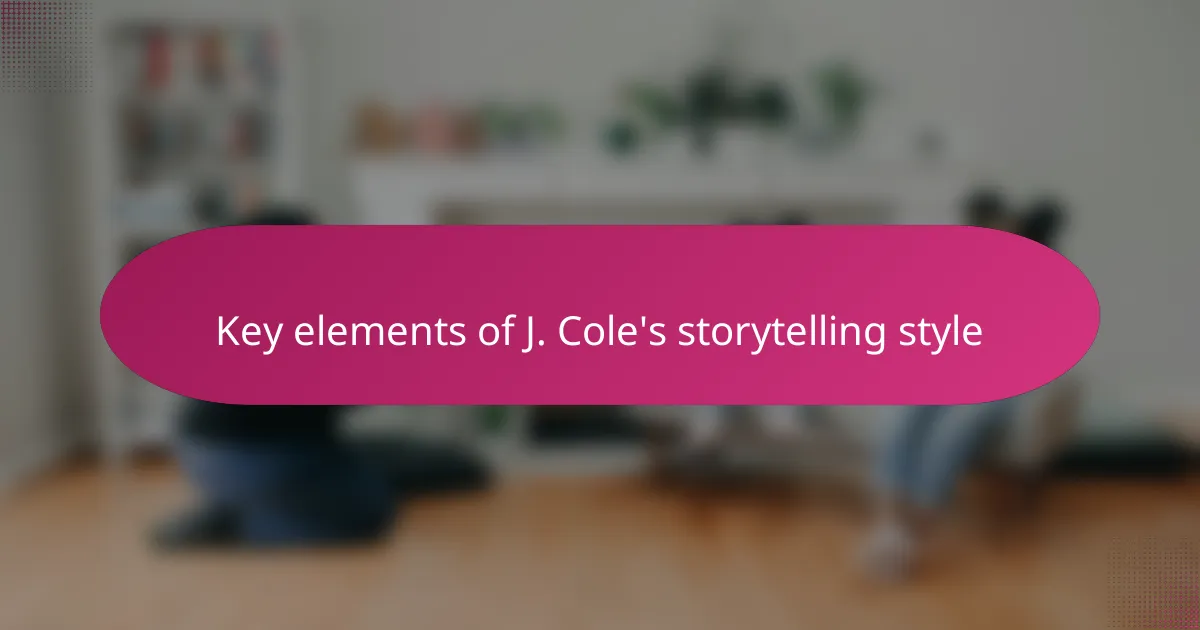
Key elements of J. Cole’s storytelling style
One thing that stands out to me about J. Cole’s storytelling is his ability to blend raw honesty with relatable themes. He doesn’t just tell a story; he invites you into moments of doubt, growth, and reflection. Have you noticed how his lyrics often feel like a conversation with an old friend who’s been through the same struggles?
I appreciate how he uses detailed imagery without overcomplicating the flow. It’s like he knows exactly which words will hit emotionally without losing the natural rhythm of the track. This balance of poetic finesse and straightforward storytelling is what keeps me coming back to his music—it feels real and accessible.
Another key element is J. Cole’s knack for weaving social commentary into personal narratives. Rather than preaching, he shares his perspective through lived experiences, which makes his critiques more powerful and thought-provoking. It’s storytelling that not only entertains but challenges you to think deeper about the world around you.
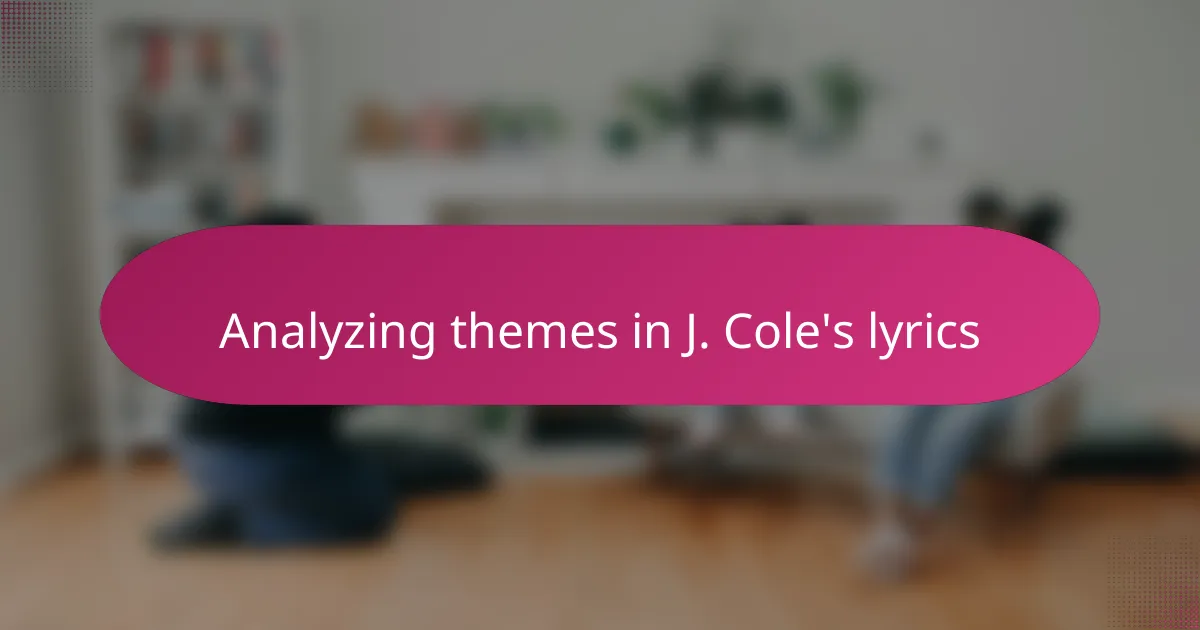
Analyzing themes in J. Cole’s lyrics
When I dive into J. Cole’s lyrics, what hits me most are the recurring themes of struggle and perseverance. He doesn’t shy away from depicting the harsh realities of life, but there’s always an undercurrent of hope and self-improvement that feels deeply motivating. Have you noticed how he turns vulnerability into strength, making his stories feel like lifelines rather than just narratives?
What really fascinates me is how J. Cole explores themes of identity and self-reflection in a way that feels intimate yet universal. Listening to tracks like “Love Yourz,” I find myself questioning my own priorities and the meaning of happiness. It’s as if he’s holding up a mirror, encouraging us to confront our truths without judgment.
Then there’s the social consciousness embedded in his music—issues like racial inequality, mental health, and systemic injustice aren’t just mentioned; they are lived experiences he shares thoughtfully. This approach never feels preachy to me; instead, it sparks important conversations in my mind about the world we live in, making his storytelling not just personal but profoundly impactful.
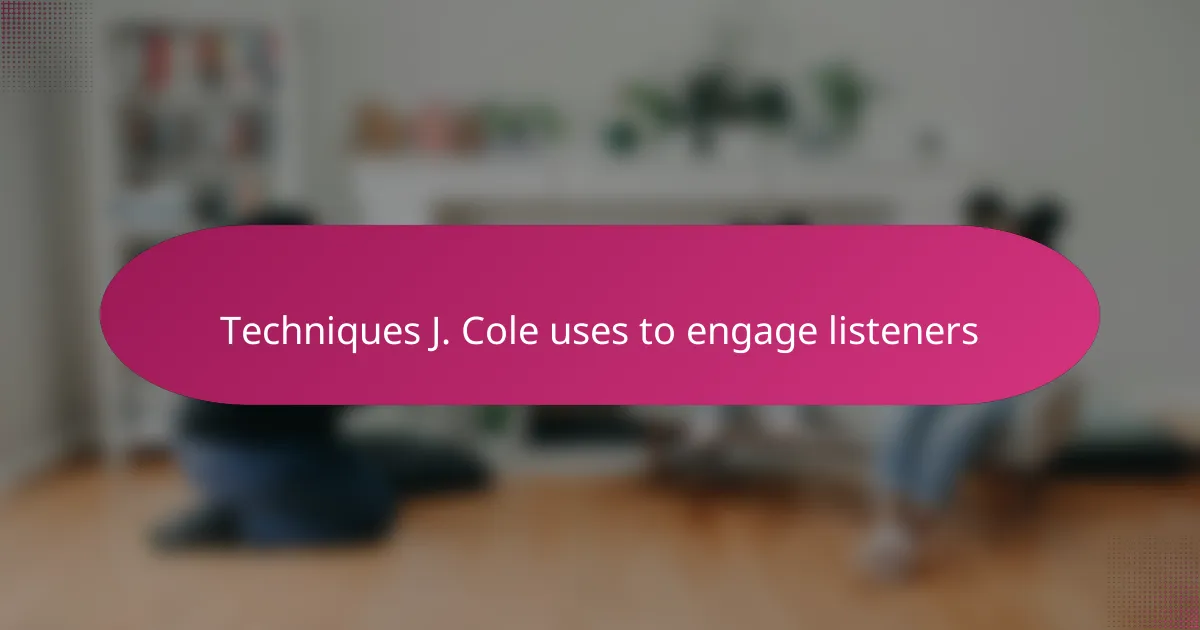
Techniques J. Cole uses to engage listeners
One technique J. Cole uses that really draws me in is his masterful use of vivid imagery combined with simple, relatable language. It’s like he’s painting pictures without overwhelming the listener, making each story easy to follow yet deeply emotional. Have you ever found yourself hanging onto every word because the scene he’s describing feels so real?
Another thing I’ve noticed is how J. Cole’s storytelling often feels like an honest chat rather than a performance. He invites you into his world with a tone that’s both reflective and intimate, which makes you feel more connected to his journey. It’s the kind of connection that keeps me replaying a song, searching for new layers I hadn’t caught before.
What really stands out to me is his skillful way of blending personal stories with larger social themes without sounding preachy. He doesn’t just tell; he makes you think by weaving in deeper questions about life and society. It’s rare to find an artist who can challenge you intellectually while still feeling authentic and relatable.
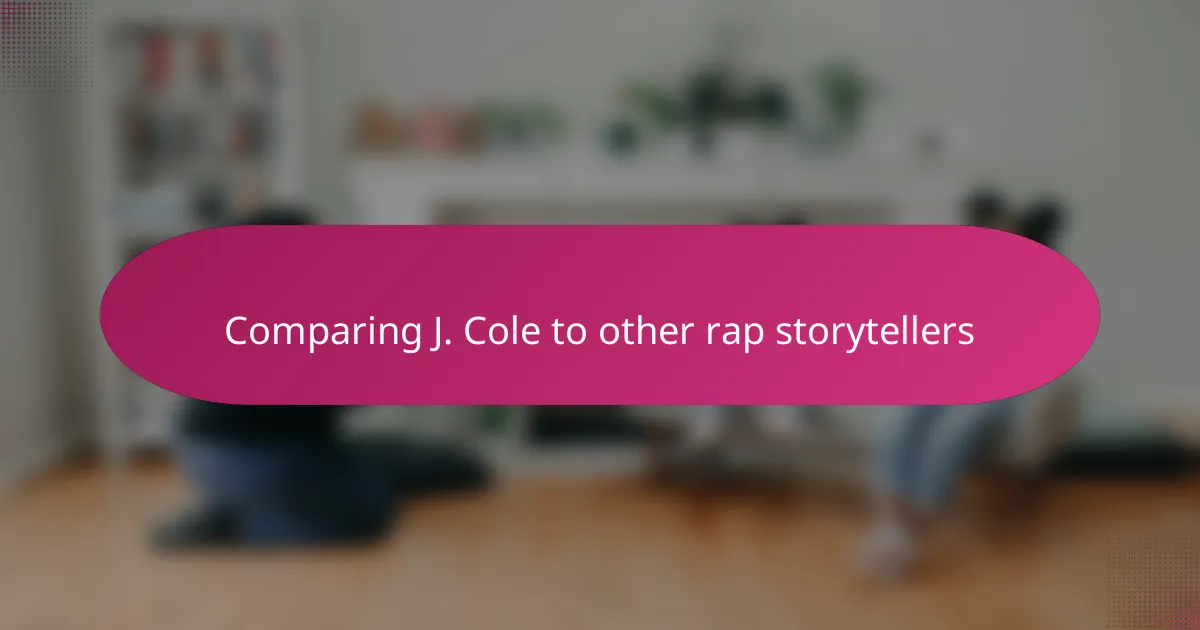
Comparing J. Cole to other rap storytellers
What I often think about when comparing J. Cole to other rap storytellers is his unique balance between vulnerability and social critique. Unlike some artists who focus heavily on either bravado or activism, J. Cole weaves both into his narratives seamlessly, making his stories feel grounded yet thought-provoking. Have you noticed how this blend makes his music resonate on a deeper level, inviting listeners to both feel and reflect?
When I listen to legends like Nas or Kendrick Lamar, I appreciate their complex storytelling layers and vivid imagery, but J. Cole’s approach feels more conversational to me. It’s almost like he’s sitting across from you, sharing his struggles and growth honestly without any filters. That raw, unpolished authenticity is something I find especially compelling—it creates a sense of intimacy that’s rare in rap.
Sometimes, I wonder if J. Cole’s directness is what sets him apart in the storytelling game. While other rappers might use elaborate metaphors or cinematic tales, he often opts for clarity and emotional openness. This makes his stories accessible without sacrificing depth, and I think that’s why so many people, including myself, feel genuinely connected to his music.
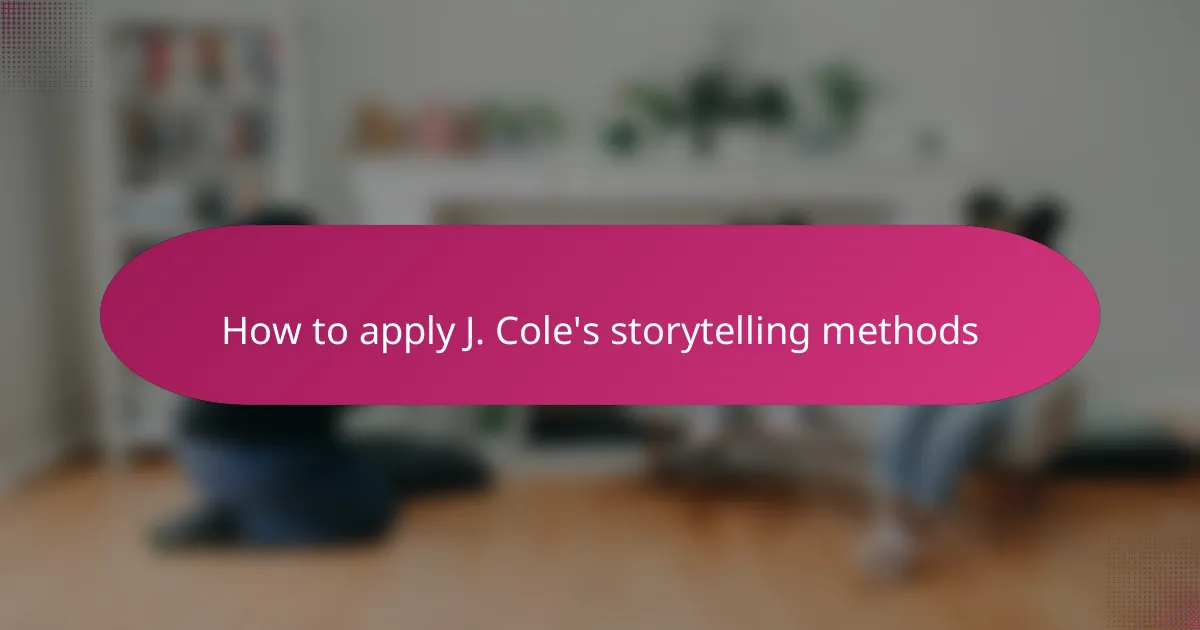
How to apply J. Cole’s storytelling methods
Applying J. Cole’s storytelling methods starts with embracing honesty in your lyrics. I’ve found that when you’re willing to reveal your true feelings—even the messy or uncomfortable ones—listeners can sense it, and suddenly your story becomes their story too. Have you ever tried writing something just to get it off your chest? That raw emotion is the key J. Cole taps into.
Another step I’ve learned is to focus on everyday moments packed with meaningful details. J. Cole doesn’t rely on grandiose scenes; instead, he captures small, relatable snapshots that paint a bigger picture. When I write, I try zooming in on a single image or feeling, knowing that tiny details make a story come alive just like he does.
Lastly, I think it’s crucial to blend personal experience with broader themes that make people think. J. Cole’s technique of weaving social issues seamlessly into his own journey teaches me not to shy away from tough topics but to frame them through my own lens. Have you noticed how that approach invites listeners to reflect without feeling preached to? That’s storytelling done right.
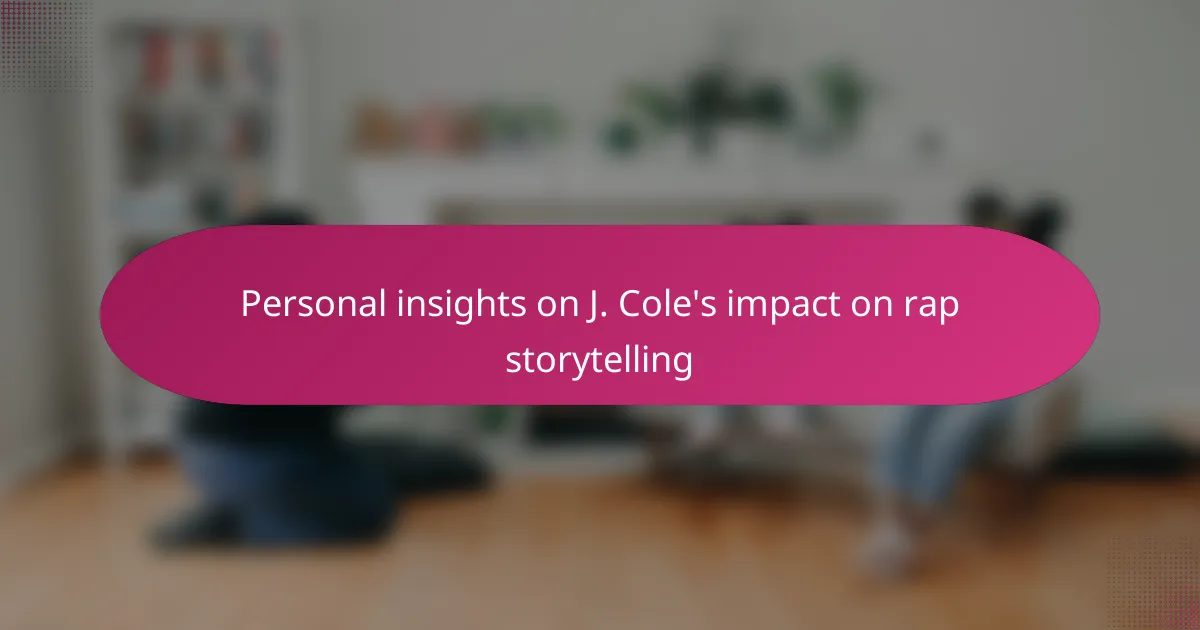
Personal insights on J. Cole’s impact on rap storytelling
What truly strikes me about J. Cole’s impact on rap storytelling is how he transformed it from mere entertainment into a form of emotional therapy. I remember the first time a song of his made me pause and confront my own vulnerabilities—it was unsettling yet liberating. Have you ever experienced that kind of raw honesty in music that feels like a trusted friend speaking directly to you?
I think J. Cole’s stories resonate because they are unfiltered slices of real life, not just crafted personas. His ability to expose personal flaws alongside societal issues challenges me to be both self-aware and empathetic. It’s this dual impact that makes his storytelling feel not only authentic but also deeply transformative on a personal level.
Sometimes I wonder if the true power of his storytelling lies in its simplicity. By stripping away the spectacle and focusing on relatable human experiences, he invites listeners to see their own struggles reflected in his words. Isn’t that the essence of great storytelling—to make us feel understood, less alone, and maybe even hopeful?
